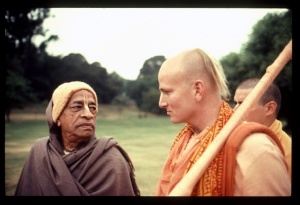SB 3.1.18

A.C. Bhaktivedanta Swami Prabhupada
TEXT 18
- pureṣu puṇyopavanādri-kuñjeṣv
- apaṅka-toyeṣu sarit-saraḥsu
- ananta-liṅgaiḥ samalaṅkṛteṣu
- cacāra tīrthāyataneṣv ananyaḥ
SYNONYMS
pureṣu — holy places like Ayodhyā, Dvārakā and Mathurā; puṇya — piety; upa-vana — the parks; adri — hill; kuñjeṣu — in the orchards; apaṅka — without sin; toyeṣu — in the water; sarit — river; saraḥsu — lakes; ananta-liṅgaiḥ — the forms of the Unlimited; samalaṅkṛteṣu — being so decorated; cacāra — executed; tīrtha — places of pilgrimage; āyataneṣu — holy lands; ananyaḥ — alone or seeing Kṛṣṇa alone.
TRANSLATION
He began to travel alone, thinking only of Kṛṣṇa, through various holy places like Ayodhyā, Dvārakā and Mathurā. He traveled where the air, hill, orchard, river and lake are all pure and sinless and where the forms of the Unlimited decorate the temples. Thus he performed the pilgrim's progress.
PURPORT
These arcā forms of the Lord may be considered idols by the atheists, but that does not matter for persons like Vidura or His many other servants. The forms of the Lord are mentioned here as ananta-liṅga. Such forms of the Lord have unlimited potency, the same as that of the Lord Himself. There is no difference between the potencies of the arcā and those of the personal forms of the Lord. The example of the postbox and post office may be applied here. The little postboxes distributed all over the city have the same potency as the postal system in general. The duty of the post office is to carry letters from one place to another. If one puts letters in postboxes authorized by the general post office, the function of carrying letters is performed without a doubt. Similarly, the arcā-mūrti can also deliver the same unlimited potency of the Lord as when He is personally present. Vidura, therefore, could see nothing but Kṛṣṇa in the different arcā forms, and ultimately he was able to realize Kṛṣṇa alone and nothing else.